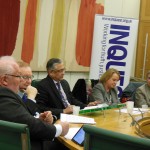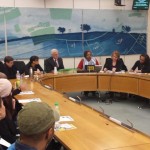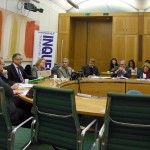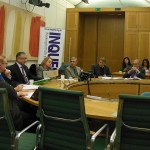Using the skills - 2.1 Working with MPs and other policymakers

What is working with MPs and policymakers?
Working with MPs and policymakers is also called “lobbying” which simply means getting people who make decisions at a senior level in organisations, local councils or government to support your cause or campaign. Anyone can lobby their local authority or MP, from individuals, to organisations such as INQUEST which supports families in an effort to change policy at a national level.Click here to read more >

Working with local councillors
Your local council has legal responsibility for matters such as housing and homelessness, children and young people’s services, adult social care and education. Although not always directly linked, some of these issues can have a knock-on effect that may be relevant to you and your case. Each council (or local authority) has to carry out government policy at a local level.Click here to read more >

How can I work with my MP?
All MPs can be contacted by e-mail, letter or phone or at a surgery at their constituency office. Your MP should respond to your requests, and listen to your concerns. Most MPs (not all of course) respond positively to specific requests: it saves them having to work out the best way forward, and it makes you look like you mean business and won’t waste their time.Click here to read more >

Working with other MPs and parliament
As well as working with your own MP you can try to influence others in parliament in a number of different ways; Petitions: a written petition can be presented to Downing Street. You can also start an e-petition. These are an easy, personal way for you to influence government and Parliament in the UK.Click here to read more >

Working with INQUEST
One of INQUEST’s core values is to “ensure that the collective experience of those with whom we work is fed back to the relevant policy makers”. In short INQUEST helps involve families with lobbying. The organisation is committed to helping families engage with the people who have the power to make real and lasting change.Click here to read more >

The power of local media
Most elected representatives are as concerned about their local media coverage as about appearing in the national press. They have to work hard to keep a good reputation with the local media. They also read local papers so they can stay in touch with what is happening in their area.Click here to read more >

Contacting your MP
To find out whom your MP is you can do a quick internet search: www.findyourmp.parliament.uk or you can telephone the House of Commons Public Information Office: 020 7219 4272. For any other parliamentary information refer to: hcinfo@parliament.uk.Click here to read more >

Some useful parliamentary terms
Find out the meaning and definition of these terms: Bill, Early Day Motion (EDM), Adjournment debate, Green Paper, White Paper, PPSClick here to read more >
Using the skills - 2.2 Working with other families

Working with other families
INQUEST was founded by families, and continues to work with and support families. This may be in the form of legal casework, emotional support, campaigns, or with practical support regarding the investigative and inquest system. But it also goes deeper than that.Click here to read more >

The Family Forum
The Family Forum meets twice a year, and gives families the opportunity to meet new people, to share their experiences, and to feed back to INQUEST their thoughts, feelings and ideas on a range of issues which are established by agenda before the meeting. Travel expenses are paid and tea, coffee and lunch are provided.Click here to read more >

Other ways you can help
Attending the family forum is one way of getting involved with other families, but mutual support is broader than that. One of the most crucial of these is attending inquests with another family. Families who have not had their inquest yet can attend another family’s inquest and find out what happens. They have the chance to see how the process works first hand and prepare better for their own inquest.Click here to read more >

Tips for working with other families
Before getting involved think about how much time and commitment you want to give. Use some of the tools in Section 1 to help you plan. Don’t worry about specific skills (although if you have specialist knowledge that would be great), try and identify things that you can do to get involved.Click here to read more >
Using the skills - 2.3 Using the media

Using the media
Achieving changes to the way a system or policy works relies on getting a message across – whether to policy makers, politicians, members of the public, other families, or to other campaigning groups and organisations. People now have greater access to creating their own media outlets than ever before.Click here to read more >

Preparing to use the media
The most accessible source of media coverage tends to be newspapers, especially local papers. There is a chance that your local press may have covered the death, the circumstances of the death and may even carry information regarding the inquest.Click here to read more >

Press release contents
Always date your media release and provide an embargo date (which requires them to not publish information until the date specified) if required, and gives journalists time to research a story. You need an attention-grabbing headline that will give a concise summary of the story.Click here to read more >

Radio and Television
Large campaign groups and lobbying organisations spend a lot of money employing people to take care of their media strategy and public relations. This is how they develop a big enough public profile to feature regularly on radio and TV. This is not an option for family campaigns, and it is very difficult to force your way onto the national media.Click here to read more >

Social media
Social media, like websites, blogs, Facebook, Twitter and YouTube, has changed the way people use the media. Over half the UK population has a Facebook account. You can use Facebook to talk about your campaign, contact supporters and get people talking about what matters to you.Click here to read more >

What to do if you are receiving unwanted attention from the press
This section has concentrated so far on families using the media for their benefit and trying to set the news agenda. Sadly there are also cases where families have found the press and media to be intrusive, threatening and produced stories that show the families of those who have died, and / or their relative, in a bad light.Click here to read more >

Tips for using the media
Be clear about what you want your message to be before you engage with the media. What do you want to say and why? Make up a list of media outlets, with names, telephone numbers and e-mail addresses. Update it regularly. Every media organisation works to a deadline. Find out what they are.Click here to read more >
Using the skills - 2.4 Campaigning

What is campaigning?
INQUEST was founded by families campaigning. This is its history, and is something that shapes the organisation to this day. The original campaigns were set up by the friends and family of Blair Peach, Jimmy Kelly and Liddle Towers after deaths following contact with the police, and Mathew O’Hara and Richard Campbell following deaths in prison.Click here to read more >

Some examples of family campaigns
Family campaigns rely on individuals and groups finding ways to change things. They share much in common such as demands for justice, truth, and reform but also vary in what they want to achieve in the long term, tactics, size of the campaign and the amount of support they receive.Click here to read more >

Tips on campaigning
Decide what you want to achieve before getting involved and set that as your objective or aim. Do some research in advance – find out what’s going on already, what the government is doing on the issue, policy, other groups, or families who might have been affected.Click here to read more >
